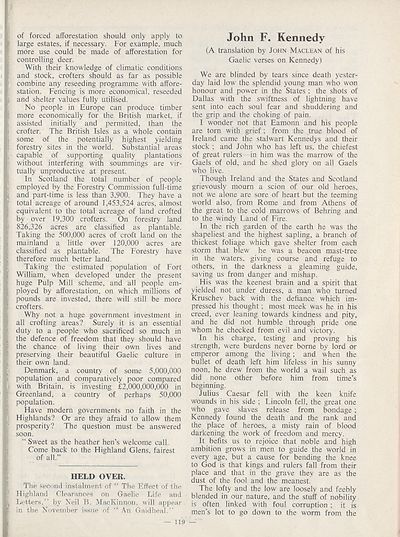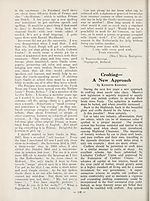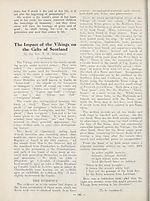An Comunn Gàidhealach Publications > Gaidheal > Volumes 58--62(part), January, 1963--March 1967
(363) Page 119
Download files
Complete book:
Individual page:
Thumbnail gallery: Grid view | List view

of forced afforestation should only apply to
large estates, if necessary. For example, much
more use could be made of afforestation for
controlling deer.
With their knowledge of climatic conditions
and stock, crofters should as far as possible
combine any reseeding programme with affore¬
station. Fencing is more economical, reseeded
and shelter values fully utilised.
No people in Europe can produce timber
more economically for the British market, if
assisted initially and permitted, than the
crofter. The British Isles as a whole contain
some of the potentially highest yielding
forestry sites in the world. Substantial areas
capable of supporting quality plantations
without interfering with soummings are vir¬
tually unproductive at present.
In Scotland the total number of people
employed by the Forestry Commission full-time
and part-time is less than 3,900. They have a
total acreage of around 1,453,524 acres, almost
equivalent to the total acreage of land crofted
by over 19,300 crofters. On forestry land
826,326 acres are classified as plantable.
Taking the 500,000 acres of croft land on the
mainland a little over 120,000 acres are
classified as plantable. The Forestry have
therefore much better land.
Taking the estimated population of Fort
William, when developed under the present
huge Pulp Mill scheme, and all people em¬
ployed by afforestation, on which millions of
pounds are invested, there will still be more
crofters.
Why not a huge government investment in
all crofting areas? Surely it is an essential
duty to a people who sacrificed so much in
the defence of freedom that they should have
the chance of living their own lives and
preserving their beautiful Gaelic culture in
their own land.
Denmark, a country of some 5,000,000
population and comparatively poor compared
with Britain, is investing £2,000,000,000 in
Greenland, a country of perhaps 50,000
population.
Have modern governments no faith in the
Highlands? Or are they afraid to allow them
prosperity? The question must be answered
soon.
“ Sweet as the heather hen’s welcome call.
Come back to the Highland Glens, fairest
of all.”
HELD OVER.
The Second instalment of “ The Effect of the
Highland Clearances on Gaelic Life and
Letters,” by Neil B. MacKinnon, will appear
in the November issue of “ An Gaidheal.”
— 119
John F. Kennedy
(A translation by John Maclean of his
Gaelic verses on Kennedy)
We are blinded by tears since death yester¬
day laid low the splendid young man who won
honour and power in the States ; the shots of
Dallas with the swiftness of lightning have
sent into each soul fear and shuddering and
the grip and the choking of pain.
I wonder not that Eamonn and his people
are tom with grief ; from the true blood of
Ireland came the stalwart Kennedys and their
stock ; and John who has left us. the chiefest
of great rulers—in him was the marrow of the
Gaels of old, and he shed glory on all Gaels
who live.
Though Ireland and the States and Scotland
grievously mourn a scion of our old heroes,
not we alone are sore of heart but the teeming
world also, from Rome and from Athens of
the great to the cold marrows of Behring and
to the windy Land of Fire.
In the rich garden of the earth he was the
shapeliest and the highest sapling, a branch of
thickest foliage which gave shelter from each
storm that blew he was a beacon mast-tree
in the waters, giving course and refuge to
others, in the darkness a gleaming guide,
saving us from danger and mishap.
His was the keenest brain and a spirit that
yielded not under duress, a man who turned
Kruschev back with the defiance which im¬
pressed his thought; most meek was he in his
creed, ever leaning towards kindness and pity,
and he did not humble through pride one
whom he checked from evil and victory.
In his charge, testing and proving his
strength, were burdens never borne by lord or
emperor among the living ; and when the
bullet of death left him lifeless in his sunny
noon, he drew from the world a wail such as
did none other before him from time’s
beginning.
Julius Caesar fell with the keen knife
wounds in his side ; Lincoln fell, the great one
who gave slaves release from bondage ;
Kennedy found the death and the rank and
the place of heroes, a misty rain of blood
darkening the work of freedom and mercy.
It befits us to rejoice that noble and high
ambition grows in men to guide the world in
every age, but a cause for bending the knee
to God is that kings and rulers fall from their
place and that in the grave they are as the
dust of the fool and the meanest.
The lofty and the low are loosely and feebly
blended in our nature, and the stuff of nobility
is often linked with foul corruption ; it is
men’s lot to go down to the worm from the
large estates, if necessary. For example, much
more use could be made of afforestation for
controlling deer.
With their knowledge of climatic conditions
and stock, crofters should as far as possible
combine any reseeding programme with affore¬
station. Fencing is more economical, reseeded
and shelter values fully utilised.
No people in Europe can produce timber
more economically for the British market, if
assisted initially and permitted, than the
crofter. The British Isles as a whole contain
some of the potentially highest yielding
forestry sites in the world. Substantial areas
capable of supporting quality plantations
without interfering with soummings are vir¬
tually unproductive at present.
In Scotland the total number of people
employed by the Forestry Commission full-time
and part-time is less than 3,900. They have a
total acreage of around 1,453,524 acres, almost
equivalent to the total acreage of land crofted
by over 19,300 crofters. On forestry land
826,326 acres are classified as plantable.
Taking the 500,000 acres of croft land on the
mainland a little over 120,000 acres are
classified as plantable. The Forestry have
therefore much better land.
Taking the estimated population of Fort
William, when developed under the present
huge Pulp Mill scheme, and all people em¬
ployed by afforestation, on which millions of
pounds are invested, there will still be more
crofters.
Why not a huge government investment in
all crofting areas? Surely it is an essential
duty to a people who sacrificed so much in
the defence of freedom that they should have
the chance of living their own lives and
preserving their beautiful Gaelic culture in
their own land.
Denmark, a country of some 5,000,000
population and comparatively poor compared
with Britain, is investing £2,000,000,000 in
Greenland, a country of perhaps 50,000
population.
Have modern governments no faith in the
Highlands? Or are they afraid to allow them
prosperity? The question must be answered
soon.
“ Sweet as the heather hen’s welcome call.
Come back to the Highland Glens, fairest
of all.”
HELD OVER.
The Second instalment of “ The Effect of the
Highland Clearances on Gaelic Life and
Letters,” by Neil B. MacKinnon, will appear
in the November issue of “ An Gaidheal.”
— 119
John F. Kennedy
(A translation by John Maclean of his
Gaelic verses on Kennedy)
We are blinded by tears since death yester¬
day laid low the splendid young man who won
honour and power in the States ; the shots of
Dallas with the swiftness of lightning have
sent into each soul fear and shuddering and
the grip and the choking of pain.
I wonder not that Eamonn and his people
are tom with grief ; from the true blood of
Ireland came the stalwart Kennedys and their
stock ; and John who has left us. the chiefest
of great rulers—in him was the marrow of the
Gaels of old, and he shed glory on all Gaels
who live.
Though Ireland and the States and Scotland
grievously mourn a scion of our old heroes,
not we alone are sore of heart but the teeming
world also, from Rome and from Athens of
the great to the cold marrows of Behring and
to the windy Land of Fire.
In the rich garden of the earth he was the
shapeliest and the highest sapling, a branch of
thickest foliage which gave shelter from each
storm that blew he was a beacon mast-tree
in the waters, giving course and refuge to
others, in the darkness a gleaming guide,
saving us from danger and mishap.
His was the keenest brain and a spirit that
yielded not under duress, a man who turned
Kruschev back with the defiance which im¬
pressed his thought; most meek was he in his
creed, ever leaning towards kindness and pity,
and he did not humble through pride one
whom he checked from evil and victory.
In his charge, testing and proving his
strength, were burdens never borne by lord or
emperor among the living ; and when the
bullet of death left him lifeless in his sunny
noon, he drew from the world a wail such as
did none other before him from time’s
beginning.
Julius Caesar fell with the keen knife
wounds in his side ; Lincoln fell, the great one
who gave slaves release from bondage ;
Kennedy found the death and the rank and
the place of heroes, a misty rain of blood
darkening the work of freedom and mercy.
It befits us to rejoice that noble and high
ambition grows in men to guide the world in
every age, but a cause for bending the knee
to God is that kings and rulers fall from their
place and that in the grave they are as the
dust of the fool and the meanest.
The lofty and the low are loosely and feebly
blended in our nature, and the stuff of nobility
is often linked with foul corruption ; it is
men’s lot to go down to the worm from the
Set display mode to:
![]() Universal Viewer |
Universal Viewer | ![]() Mirador |
Large image | Transcription
Mirador |
Large image | Transcription
| An Comunn Gàidhealach > An Comunn Gàidhealach Publications > Gaidheal > Volumes 58--62(part), January, 1963--March 1967 > (363) Page 119 |
|---|
| Permanent URL | https://digital.nls.uk/127153137 |
|---|
| Description | This contains items published by An Comunn, which are not specifically Mòd-related. It includes journals, annual reports and corporate documents, policy statements, educational resources and published plays and literature. It is arranged alphabetically by title. |
|---|
| Description | A collection of over 400 items published by An Comunn Gàidhealach, the organisation which promotes Gaelic language and culture and organises the Royal National Mòd. Dating from 1891 up to the present day, the collection includes journals and newspapers, annual reports, educational materials, national Mòd programmes, published Mòd literature and music. |
|---|---|
| Additional NLS resources: |
|

